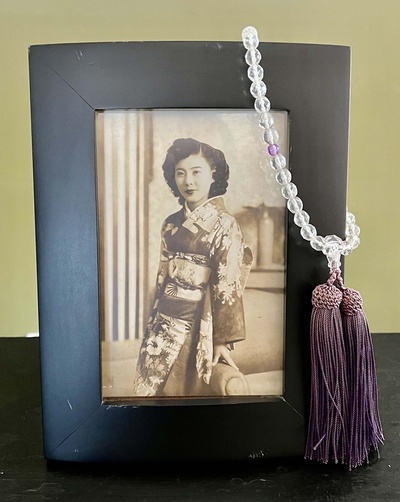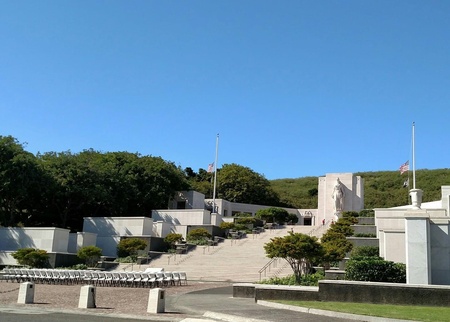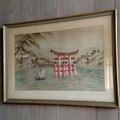Author’s note: After my mother had passed and my brothers and I were cleaning out her house, I was overcome with such intense grief—unrelenting waves upon waves of sadness compounded by a lacerating guilt for all the things I should have told her while she was still alive. To deal with those intense emotions, I’d often write in my journal, and those notes would later become the basis for this fictional short story, “Finding the Right ‘Keiko.’”
* * * * *
“I’m sorry,” I finally admitted, flushed with embarrassment, “but I don’t know how to write my mother’s name.”
The Buddhist priest looked at me, his brow furrowed in a mixture of surprise and reproach. Or maybe I was just imagining that. Planning my mother’s funeral had reduced me to a snarl of raw emotions, and I found myself overreacting to tiny slights, whether real or imagined.
“Well, maybe you’d recognize her name if I showed it to you,” the priest said as he swiveled in his chair to reach for a book on the shelf behind him. He quickly flipped through the pages to find the entry for my mother’s name. “Just as I suspected, there are multiple ways to write ‘Keiko,’ actually, eight common ways and a few more obscure ones, and each has a different meaning. Do any one of these look familiar?”
I studied all the variations of Keiko but none of them stood out. As a kid, my parents had forced me to attend a Japanese-language school after regular public school in Honolulu. This was every weekday and also a half day on Saturdays. I resented this imposition because all my friends would be off skateboarding, playing baseball, or roaming the streets of Moiliili in a bicycle gang. I stuck it out for two years and then, after a round of failing grades, my parents finally relented and let me quit.
“I’m sorry but I don’t recognize these kanji. The only one I know is the character ‘ko’ for child. I guess I should have studied harder in Japanese school,” I said, half laughing.
The priest’s face slowly softened and broke into a slight, sympathetic smile. “Don’t worry,” he said, “many Japanese Americans of your generation don’t know their kanji. In fact, some barely even know their hiragana,” referring to the phonetic Japanese alphabet that I had somehow learned in my meager studies of the language. Even though I was a lousy student, I had actually learned all 46 of the basic hirigana characters, but the thousands of kanji were way beyond my abilities or interest. I knew how to write my own name in kanji, but that was about it.
“Is it important to have her name in kanji?” I asked, hoping that the embarrassing gap in my knowledge could be sloughed off.
“Well,” the priest said, his eyes peering at me from above the rim of his glasses, “it would be most helpful to have it. You see, I’d need her kanji to help determine her future name for when she’s reborn.”
I looked again at the book of Japanese names and saw how, although the eight versions of “Keiko” were homonyms, each had a different meaning. One variation denoted “respectful child,” another stood for “blessed child,” and still another meant “sunlight child.” And one of the Keikos was for “square jewel child,” whatever that meant. I tried to imagine what description best fit Mom and thought perhaps that “respectful child” came closest, but did that really mean anything?
“Of course,” the priest continued, “I could come up with a name for her without knowing the kanji of her past name, but it would really be best if I had that information.”
“So what you’re saying is that, without her kanji, you’d have to come up with a sort of generic name for her?”
“Well, I wouldn’t put it quite that way. I could always base her future name on a characteristic of hers. Say, for example, that she loved music. Then I could base her name on that information. It would be fine, but let’s say you did know her kanji and it was this one — ‘lucky child’ — then I would use the kanji for luck and combine it with other kanji to arrive at her name for when she’s reborn.”
I sat there, taking everything in, as the priest got up with the reference book and made his way to a large photocopier in the adjacent office. It’s quite possible that, at some point in my life, perhaps in my early childhood, Mom did tell me about her name, what it meant and how it was written in kanji. But I had absolutely no recollection of any such conversation.
What I did have were vivid memories of my mother’s voice scolding me after I had forgotten to do a chore or had ignored her advice, “Why don’t you listen to me? Do you think I’m talking just to hear the sound of my own voice?”
My thoughts were interrupted by the priest’s footsteps. “It’s unfortunate,” he said, returning to his office, “that your father passed away several years ago because he would surely have known how to write your mother’s name. But perhaps other relatives can help? You could show them the page I photocopied of the Keiko kanji to see if it sparks anyone’s memory.” Yet Mom was an only child, her parents had died decades ago, and I didn’t know how to contact any of her distant cousins in California.
After thanking the priest for his patience, I got into my car but didn’t know where to go. I was lost in my thoughts and knew only one thing: I didn’t want to return to my parents’ house. There, in the plantation-style wooden structure, the two-bedroom home where I had been raised, were the accumulated remnants of a fifty-year marriage. Sorting through their belongings had become an overwhelming task because of the intense emotions imparted by so many of those items. In going through their things earlier in the week, trying to decide which ones to give to relatives and friends, to donate to Goodwill, or to discard as trash, I had become undone by even the most mundane of their possessions.
Dad’s collection of sheep-hair brushes had me choked with emotion, thinking about the watercolors he’d paint. A small plastic bowl that Mom used to serve me her seven-layer Jello dessert had me fighting back tears. The bamboo mah-jong set that we used to play a three-handed game deep into the night, sometimes until the early sunrise, had reduced me to sobs.
I had to take a break from clearing out my parents’ home and I needed to clear my head so, from the Honpa Hongwanji temple in Nuuanu, I drove aimlessly around the Punchbowl area and, before I knew it, I was headed toward the National Memorial Cemetery of the Pacific, where my father’s ashes were interred. After passing through the entrance, I drove around the verdant green grounds, soaking in the brilliant Hawaiian sunshine and letting my mind wander in the soothing warmth of the day.
Dad had been a veteran of World War II, a member of the highly decorated 442nd Infantry Regiment, composed of Japanese Americans who had wanted to prove their loyalty to the United States. This even as the government had rounded up more than 120,000 people of Japanese descent, most of them U.S. citizens, and incarcerated them in concentration camps. Dad never talked about the war, yet I always felt its presence in his deepest being, like an apricot pit stuck in his gut. What I did know was only what his sister, my Aunt Emiko, once told me, that of the half dozen of his high school buddies who enlisted, he was the only one to return.
That sadness was always a part of my father, and it revealed itself only in his most unguarded moments. I remembered a night long ago—I was maybe five or six—when Dad was up late, drinking sake in the backyard. Mom asked him repeatedly to come into the house but he refused and sat there on an old lawn chair, staring off into the night.
At some point, he began singing a tune in his tender, unsteady tenor. The song was enka, or Japanese soul music, and from what I could make out with my limited Japanese, the lyrics were about life’s crooked paths, painful regrets, and dashed ambitions. He sang with such sad intensity that I was both moved and unnerved, but the next morning when I asked him what song he had sung, he said he had no recollection of what I was talking about.
At Punchbowl cemetery, I drove past rows and rows of low walls, each containing dozens of niches, until I arrived at my father’s final resting place. Exiting my car, I was greeted by the smell of freshly cut grass, reminding me of how well-kept the entire grounds were. I knelt before Dad’s niche and suddenly felt such a powerful wave of regret for being so ignorant of the most momentous period in his life.
I did not know, for example, how his buddies perished. Did they die trying to rescue “The Lost Battalion,” an army infantry composed of men originally from the Texas National Guard? The Lost Battalion had been surrounded by German forces in the Vosges, a mountain range in eastern France, near the German border, and two earlier rescue attempts had failed.
Military commanders decided that the 442nd would make a final attempt, although it was essentially a suicide mission. Miraculously, the Japanese-American battalion was able to break through the German line and rescue two hundred eleven of those Texans, but that victory came at an enormous cost, with the 442nd suffering more than eight hundred casualties.
Were my father’s friends among them? Could Dad even have been among the Japanese American soldiers who had helped liberate Dachau?
Looking at the plaque on Dad’s niche, I thought of something that had never occurred to me before. Throughout his life, had he felt guilty that, of his high school buddies, he alone had survived to return to the United States, marry, and start a family? There was so much about my father that I didn’t know, and I realized then that, as with Mom, I had never learned the kanji for his name either. Fortunately, for his service, Mom was there to supply his kanji to the Buddhist priest, and Dad’s name went from “Koichi” in his current life to “Jikko” in the next, all based on those ancient Chinese characters.
When Dad had died, why hadn’t I paid more attention to the funeral arrangements? Mom had asked me to take care of just one thing—ordering the food and refreshments for the reception that followed the service—and that was all I did. If I had been more actively involved with the rest of the preparations, I would have learned Dad’s kanji and then I likely would have asked Mom about her own name.
But now my mother was going to be interred side by side with her husband in this niche, but with some quasi-generic afterlife name. Sure, Mom loved music and the priest could base her new name on that, but didn’t everyone love music? What kind of son was I, so unappreciative and disrespectful?
As I struggled to tamp down my emotions, a thought occurred to me. Maybe Aunt Emiko, my father’s older sister, might be able to help. She was Dad’s only sibling and, being four years older, she was always looking out for him. And she and Mom had been close, regularly phoning each other to share recipes, exchange family gossip, and discuss the latest happenings of the Korean soap operas they watched.
But Aunt Emiko had had a rough couple of years. Alzheimer’s had stricken her memory and her children had recently moved her to The Plaza, an assisted-living facility. Initially, she had been assigned a unit on the top floor of the five-story building, where the residents lived independently in small apartments. But as her memory became increasingly impaired, the staff moved her to a lower floor, where her kitchen contained a refrigerator and microwave but no stove, and where she was no longer allowed an iron. Still, the last time I visited, even though her short-term memory was lacking, her recall of long-ago events was still sharp. Would she know the kanji for her sister-in-law’s name?
*This short story was originally published in The Baltimore Review (Winter 2021).
© 2021 Alden M. Hayashi







